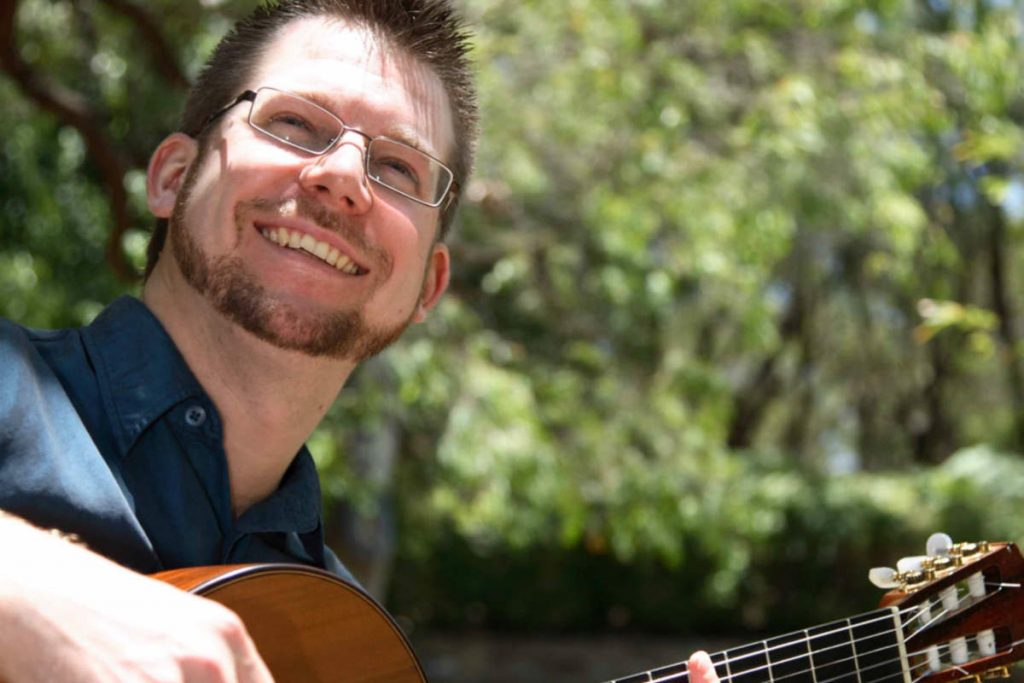Two-minute interview: Jonathan Paget, classical guitarist

Jonathan Paget is passionate about performing 19th-century guitar music on period instruments. We caught up with him before his 11 May Guitaromanie! performance to find out why.
As told to Ken Murray.
What drew you to the guitar music of the 19th century?
One of the things that excites me about 19th-century guitar music is the sensation of being a pioneer, an explorer of music that may not have been heard for a great many years. The recent explosion of online archives of original 19th-century guitar scores has meant that large swathes of music that had previously been difficult to access are now available at the touch of a button.
I wasn’t always a believer in the guitar music of the 19th century. As a younger player, I was passionate instead about Spanish music and the “Bream” repertoire (Britten, Walton, Berkeley). I was also drawn to Elizabethan lute music, and experimented with lutes of various kinds. Over time, my opinion of early 19th-century guitar music has significantly metamorphosed – the deeper I looked, the more expressive potential I found.
How does your work in musicology inform your performance practice?
I seek out original editions, and they inspire me to play stylistically. The elegant decorations of their cover pages, grandiose dedications, and fanciful illustrations give insight into the spirit of the age. When viewed through the lens of musicological knowledge, original editions also lead to interpretative epiphanies.
Musicology doesn’t necessarily make you a better musician, but it can yield powerful insights useful in the quest for historically-informed performance (HIP). I’ve come around to the view that applying HIP knowledge in performance is actually a highly creative and subjective act of interpretation, particularly as it often involves the realisation of musical practices not captured by notation.
I’ve been on a mission to find as many 19th-century guitar sonatas as I can. I currently have about 200. It’s fascinating to uncover hidden signifiers – tropes of things military, of hunting, romantic love, the pastoral, and so on – that can act as guides for musical interpretation.
What’s the advantage of playing on period instruments?
I think that a lot of music is written with particular types of instruments in mind, so it shouldn’t surprise us to find it works most naturally and effectively on period instruments. That’s not to say you can’t create effective performances on modern instruments — of course you can. But sometimes you’ll find yourself working harder than you need to, without realising it.
When it comes to the 19th-century guitar, the timbre and sound world is so seductive. Even though period guitars generally have a smaller sound, there is a grandeur and nobility to the sound that defies words. I have found playing on period instruments to be a liberating experience.
How do you see the state of guitar education in Australia?
I think that Australia has been experiencing a golden age for guitar, although I’d hazard to suggest that this is also a global phenomenon. There are a lot of young people studying classical guitar in Australia, and we have a healthy economy of guitar luthiery and a healthy culture of home-grown musical composition.
I think Australia’s ahead of the curve in terms of using the guitar ensemble as a pedagogical tool, and the ubiquity of the guitar (in all its variations) in popular culture is both a blessing and a curse to the classical instrument. The classical guitar will probably remain a niche instrument — but that’s fine with me. Long live the guitar aficionado!